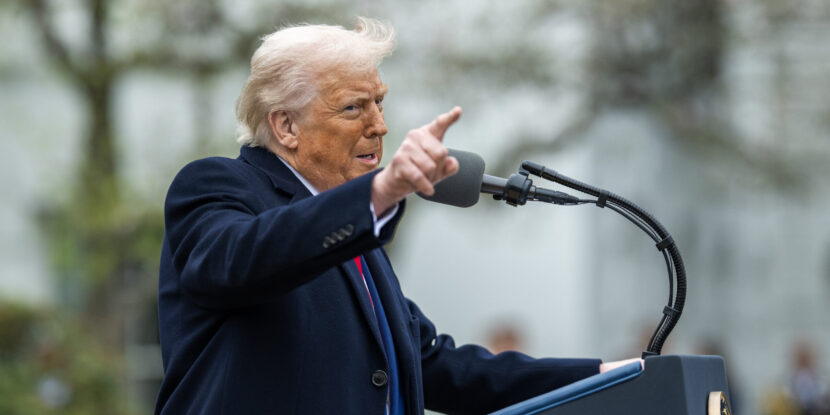
PULSE POINTS:
❓What Happened: The Department of Homeland Security (DHS) published a list of 500 sanctuary jurisdictions it says are obstructing federal immigration enforcement.
👥 Who’s Involved: DHS, Homeland Security Secretary Kristi Noem, the Trump administration, sanctuary cities, counties, and states.
Your free, daily feed from The National Pulse.
📍 Where & When: Across the U.S.; list released Thursday, May 29, 2025.
💬 Key Quote: “These sanctuary city politicians are endangering Americans and our law enforcement in order to protect violent criminal illegal aliens,” said DHS Secretary Kristi Noem.
⚠️ Impact: DHS claims sanctuary policies endanger communities and law enforcement while protecting illegal immigrants accused of criminal activity.
IN FULL:
The Department of Homeland Security (DHS) has released a list of 500 sanctuary jurisdictions it accuses of obstructing federal immigration enforcement efforts under the Trump administration. The list, published Thursday on the department’s website, includes cities, counties, and states across the United States.
Homeland Security Secretary Kristi Noem criticized sanctuary city policies, stating, “These sanctuary city politicians are endangering Americans and our law enforcement in order to protect violent criminal illegal aliens.” The DHS alleges that such jurisdictions shield individuals in the country illegally from federal immigration authorities, creating risks for both communities and law enforcement.
The department explained that the list was compiled based on several factors, including whether jurisdictions identify themselves as sanctuary areas, their compliance level with federal immigration enforcement, restrictions on sharing information with immigration authorities, and legal protections for illegal immigrants.
“Sanctuary jurisdictions including cities, counties, and states that are deliberately and shamefully obstructing the enforcement of federal immigration laws endanger American communities,” the DHS statement read.
This move by the DHS comes amid increased pressure from the Trump administration on local governments to align with federal immigration law enforcement. While law enforcement in Republican governed states are increasingly complying with President Donald J. Trump’s mass deportation efforts, Democrat-controlled states continue to by-and-large resist immigration enforcement efforts.
The DHS claims that sanctuary policies allow individuals accused of criminal activity to avoid facing legal consequences, putting public safety at risk. Critics of sanctuary policies argue that they undermine the rule of law and prioritize the protection of illegal immigrants over the safety of citizens.

PULSE POINTS:
❓What Happened: President Donald J. Trump blamed Leonard Leo and the Federalist Society for recommending bad judges early in his first term, linking their influence to a U.S. Court of International Trade ruling that attempted to overturn his tariff policy.
👤Who’s Involved: President Trump, the Federalist Society, Leonard Leo, the U.S. Court of International Trade, and the New Civil Liberties Alliance.
Your free, daily feed from The National Pulse.
📍 Where & When: Truth Social platform, with Trump’s post on May 30, 2025, following the trade court’s now-stayed ruling.
🧾Key Quote: “I was new to Washington, and it was suggested that I use The Federalist Society… but then realized that they were under the thumb of a real ‘sleazebag’ named Leonard Leo,” Trump wrote.
⚠️ Impact: Trump warns that the tariff ruling threatens presidential power and America’s economic defense against adversaries like Communist China.
IN FULL:
President Donald J. Trump has blamed the Federalist Society for recommending bad judges to him near the beginning of his first term, when he had few contacts in Washington, D.C. The America First leader explained the situation on his Truth Social platform after the obscure U.S. Court of International Trade attempted to overturn his tariff policy in its entirety in a now-stayed ruling.
“Where do these… Judges come from? How is it possible for them to have potentially done such damage to the United States of America? Is it purely a hatred of ‘TRUMP?’ What other reason could it be?” Trump wrote.
He continued: “I was new to Washington, and it was suggested that I use The Federalist Society as a recommending source on Judges. I did so, openly and freely, but then realized that they were under the thumb of a real ‘sleazebag’ named Leonard Leo, a bad person who, in his own way, probably hates America, and obviously has his own separate ambitions.”
Trump said that Leo, who is still co-chairman of the Federalist Society, “openly brags how he controls Judges, and even Justices of the United States Supreme Court—I hope that is not so, and don’t believe it is!”
The President said he was “so disappointed in The Federalist Society” for its “bad advice… on numerous Judicial Nominations,” warning that if the U.S. Court of International Trade’s tariff ruling is ultimately upheld, it will “destroy our Nation!”
On the prospect of Congress having to approve every tariff, he described a process in which “hundreds of politicians would sit around D.C. for weeks, and even months, trying to come to a conclusion,” hamstringing his ability to act in the American interest against foreign governments.
“If allowed to stand, this would completely destroy Presidential Power—The Presidency would never be the same!” Trump argued, insisting, “The President of the United States must be allowed to protect America against those that are doing it Economic and Financial harm.”
“Hopefully, the Supreme Court will reverse this horrible, Country threatening decision, QUICKLY and DECISIVELY,” he said.
The New Civil Liberties Alliance, which is affiliated with Leo, is among the organizations mounting a lawfare campaign against Trump’s tariff polices, attempting to overturn levies imposed on imports from Communist China.
In 202s, Leo’s Marble Freedom Trust—a 501(c)4 nonprofit that operates as a funding organ for a network of conservative legal and policy groups—effectively received a $1.65 billion contribution through a financial deal executed by Chicago businessman Barre Seid.
READ:
show less

 4 weeks ago
2
4 weeks ago
2








 English (US) ·
English (US) ·